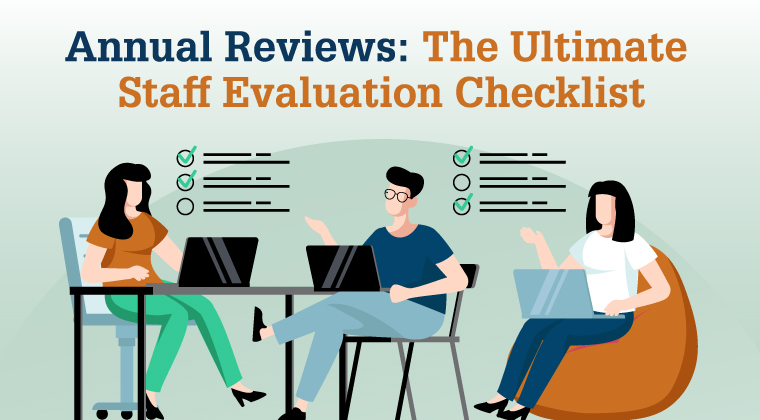Communication is key in any relationship, and in a professional environment, regular reviews are a crucial part of developing that communication between the leader and their team. When conducted properly, performance reviews allow supervisors to fairly assess their team members and implement actionable next steps. Ultimately, evaluating your staff will enable you to engage them further, provide recognition, and create opportunities for their growth.
From a productivity standpoint, implementing these conversations fosters a performance culture and improves the workplace environment.
By adeptly implementing staff evaluations, your team will have yet another tool to succeed. Here’s how to do it right.
Make It Regular
Some businesses formally review their employees as often as every quarter, while others opt for yearly reviews. Regardless of the frequency you choose, the important thing is to establish a regular review period, allowing your team to know what to expect and when to prepare.
That said, if your leadership team opts for annual reviews, then you should still conduct less formal check-ins on a monthly basis. This type of meeting will allow you to address smaller, more immediate concerns. Often known as monthly 1:1s, these check-ins help employees understand where they stand and address any issues before the more formal annual review.
Standardize
When conducting annual reviews, you’ll want to follow the same format each year so team members know what to expect. Additionally, this will help you maintain a level of consistency and ensure you don’t miss any important steps.
To accomplish this, funeral businesses should develop a written outline for the review format. On this outline, you should note each area in which you’re evaluating team members. For example, you’ll likely want to touch on communication, problem-solving, and punctuality in every team member’s review.
We also recommend including self-assessment as part of the process. Have employees evaluate themselves prior to the review, then discuss the employee’s self-assessment. From there, the manager can provide additional comments and feedback.
Focus on the Positive
When conducting evaluations of team members, it’s essential to focus on the positive aspects of the review. According to research from Harvard, top-performing teams give each other about 5.6x more positive feedback than negative feedback. That means it’s best to provide employees with almost six positive comments for every piece of criticism.
Even if there are areas where the employee could improve, setting clear expectations and providing a supportive learning environment can turn the feedback into a positive experience rather than criticism.
When providing feedback, it’s important to focus on the work being performed rather than the person. Otherwise, criticism may feel like a personal attack. For example, rather than saying, You are unprofessional, you might consider saying, Your frequent tardiness to team meetings has hindered our ability to work together.
Along with feedback, take some time to acknowledge and reward everything the employee does well. Employees who understand their strengths can lean into those and continue accomplishing exceptional work in their role.
Provide specific examples when possible. Rather than telling a team member that they consistently demonstrate empathy toward families, point out a particular instance in which they went above and beyond to make a family feel special. Rooting your feedback in specific actions helps your team understand how they can continue to excel where they are strong and troubleshoot areas in which they fall short.
Receive Feedback
In the same way that you must evaluate your staff, you should also give them an opportunity to evaluate your performance. Being a good manager means ensuring that your team has the tools and resources they need to perform. Receiving feedback from your team will allow you to see how you stand to grow as a leader.
Often, it’s helpful to request this feedback anonymously, as team members are often hesitant to critique their superiors.
Make an Action Plan
No employee evaluation is complete without a follow-up plan of action. After finishing an employee review, you’ll want to create goals and expectations for the following year.
These goals can take many forms. It may be an opportunity to work on individual challenges, or better align employees toward the goals of the company as a whole.
If an employee has performed exceptionally in their role, you can create a plan for them to take on additional responsibilities. Alternatively, if a team member’s performance has lagged, you can outline expectations they can strive for to improve performance.
In either case, your leadership should offer the training, tools, and resources the employee needs to succeed. Listening and offering this sort of support is crucial to employee morale and retaining top talent.
Document Everything
Every component of your staff evaluations should be documented. The evaluation itself, your staff’s feedback for leadership, and the goals you put in place should all be accessible to the relevant members of your team.
This gives you something to refer to during the next annual review, and it will answer some key questions:
- Did the team member meet their goals?
- Were issues of the last review addressed?
- Did leadership provide the extra support that was promised?
Annual reviews will provide the benchmarks of success for each of your team members.
Reward Your Team
In many cases, positive annual reviews will come with a raise or bonus commensurate with the employee’s performance and the overall success of your funeral home. Another way to reward your team members is through introducing incentive compensation plans. By creating a system in which team members are rewarded with bonuses, you can motivate exceptional performance, while aligning them with the companies goals.
Our team at Johnson Consulting Group, the nation’s leading death care consulting firm, can help your funeral business more effectively manage its people. Whether it’s constructing an incentive compensation plan or helping you implement the best practices of staff evaluation, our experienced team can help you refine the approach of your team.
GET IN CONTACT TODAY
